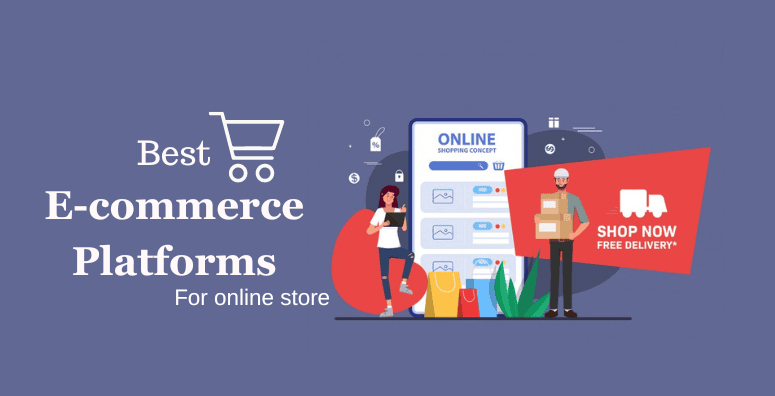Today in the digital age, selling products and services online is a great business which has many important benefits. It can help to broaden your target market, improve business discoverability, and boost revenue.

With many ecommerce platforms available, deciding on the right platform for your online store can be challenging and complicated. Fortunately, we are here to help you.
This article explores the top 10 ecommerce platforms for creating an online store. Brief overview for each platform, its key features, advantages and disadvantages, pricing, and our opinion.
In this article, we will compare the best and popular ecommerce platforms so that you can know the factors to consider when deciding on the right platform for your business. Without further ado let’s begin.
1. WooCommerce
WooCommerce is the world’s most popular WordPress plugin for the plugin. It is a completely free open source WordPress plugin for the eCommerce platform. It can be downloaded or installed from the WordPress directory like other plugin.
Since WooCommerce doesn’t provide any hosting for you, it provides all the functionality for your online store on your existing WordPress website as a plugin. If you don’t have a website yet and want to start an online store, make sure you buy web hosting and a domain name.
We recommend either buying your hosting from Hontinger or Nexcess to start your store on WooCommerce. Because both of them are one of the largest hosting service providers in the world and are also officially recommended by WooCommerce.
Get free SSL certificate + free domain name and generous 69% discount on hosting when you purchase hosting with Hostinger.
Pricing and plan
When you choose WooCommerce to start your eCommerce store, it is natural that many questions come to your mind such as “what is the price of WooCommerce” and “is WooCommerce free?”
Whereas WooCommerce is a free WordPress plugin that you can use to start your online business. To start your store on WooCommerce, you will have to spend on some basic requirements like hosting and domain. In addition, you may have to incur some additional costs to provide unique facilities and capacity to your store.
The actual cost you will incur to launch your WooCommerce store may include the following costs:
- Histing and Domain name
- Theme and templates
- Necessary tool for shopping features (payment, shipping, etc.)
- SEO, marketing and analytics integration tool (not essential but very important).
Launching an online store with WooCommerce is relatively inexpensive compared to other platforms. The platform itself is free, but you may have to pay for premium features to add more functionality to your store.
Pros
- Wide range of wordpress– So WooCommerce integrates with WordPress, and it is compatible with WordPress extensive official and third-party theme catalog.
- Able to add additional ecommerce features– WooCommerce extensions and WordPress plugins let users add more features to their online stores.
- There is a large community available for problems– Its large community can help you solve any issue related to your eCommerce store.
Cons
- A little bit complicated– It can be more difficult to get started than any other platform. Therefore, WooCommerce beginners may need to learn things like setting up hosting and domain or setup WordPress website.
- As business grows, maintenance expenses will increase slightly– As your business grows, you may have to pay on your e-commerce website to security, hosting upgrades, SEO tools, and analytics tools for the optimization tool.
2. Wix
Wix is undoubtedly one of the most popular website builders in the world. With many customizable options, Wix helpful to build a the strongest e-commerce store that are important to those beginners who want to quickly sell products and services.
Here, hosting is also provided with Wix as well as free domain name is also given free with the paid plan. This ecommerce platforms combines web hosting with site building tools to create a professional store without any coding knowledge.
There are over 500 customizable templates available on the platform. To start with, you can start with the premium plan of just INR 199. Wix offers one free and fours paid plans to accommodate all its users. Each Wix pricing has a set of unique features.
Pricing and Plans
Now let’s turn your attention to the cost of starting your own store with Wix. Pricing can vary along with features so it’s easy to get started with a plan that fits your needs.
Wix’s free plans are unusually generous, making this a help to test for great value for money on the platform. It gives you unlimited testing time to see the platform, what are the platforms like? This is a great opportunity to try the Wix and decide for yourself that it’s suitable or not for your store.
Pros
- Friendly beginner– Easy to use interface with drag and drop editor and mobile responsive templates.
- Advanced ecommerce tool – it includes a abandoned cart recovery feature that helps you track down customers who have left items in their checkout.
- Excellent app market– 250+ free and paid extended marketplaces to seamlessly add additional functionality to your online store.
- Multilingual– Create a website in different languages for different countries to grow your business globally.
Cons
- Some services on free plan disrupted– Wix’s free plan will contain ads, and users will not be able to have custom domain names. Your site URLs will be something like this mysite.wix.com with Wix’s free plan. If you plan on selling anything, you won’t be able to accept payments with the free plan.
- Choose this template carefully. Once you select a template, you cannot switch templates once the site is launched. However, you can make design changes to your existing template.
3. Weebly
Weebly is the best option for users starting small or medium-sized online stores who want to start selling online quickly. It doesn’t involve complicated setup or maintenance, so it’s the perfect choice for beginners or users who do not want to get lost in technical details.
Weebly tools make it easy for you to sell physical and digital products to customers. It lets you create an eCommerce website, add advanced features like integrated shopping cards and secure checkout.
But if you want to use an ad-free online store and your own domain name, you will need to purchase a paid plan. Plans and prices may vary depending on the specific features of Weebly, you just need to choose the plan suitable for your store.
Pricing and Plans
Weebly’s plans are categorized into four price ranges according to their features, ranging from free to $29 per month.
Whatever Weebly plan you choose, make sure that you are getting a comprehensive list of features for your online store so that your store can grow globally. Weebly is full of features and easily integrates with most native popular or third-party apps that users are interested for their website.
Weebly offers a range of pricing plans to suit different needs, from personal websites to online stores. The plans are as follows:
- Free– Able to sell unlimited items under the plan but with a Weebly subdomain and including ads.
- Personal– This plan is like the free plan but lets you use your custom domain and has more features than the free plan for just $10 per month.
- Professional– This plan costs $12 per month, gets you a free domain, adds a shipping calculator, and removes ads.
- Performance– It offers a complete e-commerce solution with advanced e-commerce features, including abandoned card emails and excellent support.
Pros
- Very easy-to-use– Weebly online stores integrate seamlessly into the website builder making it very easy for web beginners to create a store without any code knowledge.
- SSL encryption on own your domain– Your customers will only see your URLs during checkout, not any third-party domain. Which is very important from the point of view of credibility.
- Supports physical, digital goods and services– So it doesn’t matter whether you are selling clothes, mp3 or coaching classes, Weebly Web is capable of accommodating all types of online stores.
Cons
- Offline payments are not available– Customers will be able to pay only through credit card and PayPal, for example no cash on delivery or bank tranfer option available.
- PayPal in on only higher plan– standard payment method like paypal is only available on higher plan.
4. Shopify
Shopify is a subscription-based Software-as-a-Service (SaaS) ecommerce platform. It can be started at INR 20 per month for three months, however for annual subscription one has to pay INR 1499. All of its plans support branded online stores, personalized stores, and a full range of online selling tools.
Creating a sales store website with Shopify is a very easy and simple process. Shopify takes care of all the technicalities for its customers so that users can quickly get their store live without touching a single line of coding.
It allows its customers to manage and customize their store site from mobiles and tablets. All customer order or product information, including payment details or shipping information, is automatically synced between your store’s site or app with inventory.
Pricing and Plans
Shopify pricing is includes based on your monthly fee, plus added fees for payment processing, shipping level and advance POS needs.
All four plans of Shopify provide unlimited products, orders or customer support. Or data security, payment card industry (PCI) compliance or 24/7 support, along with sales and business management features.
- Basic, Shopify or advanced plans: All Shopify store plans provide a complete suite of ordering, customer, and business management with omnichannel sales-anywhere features. As you continue to move up plan tier, the more you get lower payment processing fees, large shopping discounts and access to advanced marketing reporting tool management.
- Shopify Starter: This is the cheapest plan from Shopify that supports order management with limited features. Not only this, it also shows performance metrics to analyze your sales and customer browsing behavior along with order fulfillment.
- Shopify Plus: This is the most expensive and last plan of Shopify which provides the geared features to the enterprise-level high volume, multi-application and multi-million dollar seller.
Pros and Cons
Shopify delivers a ton of sales option and business management features. But whether it’s right for you, these pros and cons of using Shopify can help you decide.
Pros
- Competitive monthly fees: Low monthly fee for entry level (INR 20) and competitive rates on higher plans.
- User-Friendly: Extremely easy for any user to set up a store, easy process to get the website live without any coding knowledge.
- Unlimited growth potential: Shopify has immense potential to easily grow from startup to large enterprise level.
Cons
- Limitations: Theme limitations: Shopify themes tend to be rather basic and adding advanced features and functionality requires specialized coding.
- Transaction fees: If you don’t use Shopify Payments, you may incur a transaction fee on every sale made via credit or debit card.
5. BigCommerce
Bigcommerce is another best e-commerce platform that allows users to create and manage an online store with easy steps. From small to big companies, users can avail themselves of all the scalble features on this platform. Which definitely suits the needs of any business in all industries.
With a wide range of integrated and advanced tools like product management, payments, SEO optimization and optimization, bigcommerce provides all the vital tools you need to be successful in the world of online selling.
Bigcommerce is a SaaS (Software-as-a-Service) based service that offers a range of customizable templates to use in designing your online store. It doesn’t matter what type of product you want to sell, bigcommerce makes it easy to display to the your products. And bigcommerce uses powerful tools to attract online audiences. However, you have to pay a monthly fee to continue using its.
Pricing and Plan
Bigcommerce offers a variety of pricing plans, each tailored to different business needs and size. It doesn’t matter if you’re a beginner or a seasoned entrepreneur, BigSommers is completely scalable for your business.
Bigcommerce has 4 types of plans on different prices depending on features for business, the details of which are as follows:
- Standard plan: The Standard plan of BigCommerce is the starter plan which is priced at $29 per month which is also the most affordable. It also offers some essential features including a drag and drop page builder and a selection of 12 other core features.
- Plus plan: Designed for growing businesses, the BigCommerce Plus plan costs $79/month. It plan offers supplemental functionalit, including the ability to sell up to $180K, special credit options, and unlimited products, coupons, and gift cards.
- Pro plan: The BigCommerce Pro plan caters to larger businesses looking for advanced features and higher revenue potential. With the $299/month BigCommerce pricing, the plans offer a generous API call limit of 60,000 calls per hour.
- Enterprise plan: Bigcommerce Enterprise plan are designed for high-volume sellers and large corporations that offers specific features such as: multi currency support, API support, priority support and more.
Pros and Cons
pros
- Ton of features: Bigcommerce include more features than other ecommerce websites. Which will save you extra money which you spend on any other third party.
- No transaction fees: bigcommerce doesn’t transaction fees with any of its plans. Specifically for Bigcommerce stores with less and a lot of transactions.
- Scalability: BigCommerce is applicable for small to large businesses. It provides all the necessary features for large enterprises from scratch making their business scalable.
Cons
- No email marketing tool: Unlike its competitors, BigCommerce doesn’t offer any email tools that allow you to rely on third-party app for it.
- Automatic plan upgrade: Each bigcommerce plan comes with annual sales limit and if the annual sales limit is exceeded then it is automatically upgraded to a higher plan.
6. Magento
Magento is another ecommerce platform that provides users with control over attractive looks, content, and functionality to create an online store. Magento provides different platforms, Magento open source (previously community edition) and Magento commerce cloud (previously enterprise edition).

Open-source is free to download and use while commerce license comes with a fee. Both the platforms provide various benefits of features to the user.
For businesses and individuals who want to develop a long-term professional ecommerce website, they may prefer Magento. Because it’s professional with open source.
Pricing
You can build your store with any one version of Magento version of three, but it is challenging task to choose right plan that is perfectly suited for your store. Let’s go started:
- Open-source: This version of Magento is completely free, so just download and install Magento to get started. There are also practically endless modification options to tailor the store to your specific needs. However, to set up and run a business, you will need to spend on domain and hosting.
- Magento commerce: Unlike Megento open source, the price of Magento commerce starts from $22000. However, this version also comes with some advanced features like drag-and-drop page builder, a built-in B2B module, content staging, rich business intelligence reports, 24/7 support and many more.
- Magento cloud: Magento Cloud costs $40000 more than Magento Commerce. It offers high-end features in addition to fast page performance and security.
Pros and Cons
Like all other platforms, it also has some pros and cons, so let’s go in depth about its advantages and disadvantages:
Pros
- High flexibility and limitless customization: Allows you to integrate third party extensions with the ability to modify the code to make your store unique and customize the template.
- Rich features list: Magento is a convenient store solution compared to any ecommerce platforms. Magento can be seen as a powerful solution for various out of the box features, marketing user experience or business performance.
- Scalability: Scalability is one of the best features of the Magento. Because slow and poorly performing websites are the biggest concern for sellers. With Magenta, you don’t need to worry about whether you have 100 products or 1,000,000 SKUs, Magento handles it with ease without any major performance tuning.
Cons
- Expensive price: The drawback of Magento is its cost, it is high expensive compared to any SaaS ecommerce platforms, Magento open source is free but there is a need to set aside a good budget for features like custom development, maintenance or extension.
- Need for hosting: Unlike Shopify, WooCommerce and other ecommerce platforms, Magento requires its own dedicated hosting. You may need to have coding knowledge to get it installed and running on a dedicated server or you may have to hire in-store developers.
Conclusion
Choosing the right ecommerce platform is critical for the success of your online business. After evaluating the top 5 ecommerce platforms, it’s clear that each one offers unique features and capabilities that cater to different business needs.
Shopify stands out with its user-friendly interface and robust suite of built-in tools, making it an excellent choice for small to medium-sized businesses. WooCommerce, on the other hand, provides extensive customization options for WordPress users, allowing for a highly tailored online store.
For enterprises seeking scalability and advanced functionality, platforms like Magento, BigCommerce, and Salesforce Commerce Cloud are worth considering. Each of these offers enterprise-level features and the ability to handle high-volume traffic and complex business requirements.
Ultimately, the “best” ecommerce platform will depend on your specific business goals, budget, and technical expertise. By carefully assessing your needs and the capabilities of each platform, you can make an informed decision that sets your online business up for long-term success.

